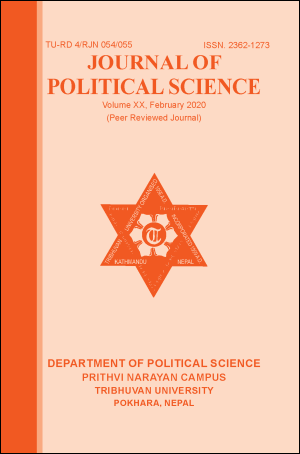Civil Society's Role in Operating and Managing Good Governance in Nepal
DOI:
https://doi.org/10.3126/jps.v20i0.31797Keywords:
Civil Society, constitution, democracy, good governance, rule of lawAbstract
Civil society is non political sphere and individual made voluntary organization widely understood as the space outside the family, market and state. It is associated for welfare of state on the ground of civic knowledge, civic education and civic virtue. Civil society works and plays its role in the democratic regime. Democratic regime operates on the basis of democratic norms and values. Civil society plays roles in the democratic society relating to maintaining, promoting and strengthening good governance. It plays various roles like participating, mediating interest, mobilizing counter knowledge, influencing policy making, building commitment for public good, giving impetus to community building projects, motivating citizens, government towards co-operation, etc. It can play the communicative role, protective role, control role, socialization role, service delivery role and the global citizenship role in different cases. Major areas of good governance are democracy, rule of law, proprietary rights, corporate governance, human rights, welfare state and labor institution. And in these areas civil society can perform their respective roles. In the case of Nepal some roles have been managed under constitution and statutory law mainly in good governance operation and management act. But these provisions seem inadequate for showing their role visibly. Maintaining good governance through properly implementing fundamental rights, government has not made effective laws yet. Nepalese parliament has promulgated the act named good governance operation and management act 2008. Here some provisions relating to civil society's role in operating and managing process has been mentioned. In this article constitutional role as well as legal role has been taken in due consideration because civil society's constitutional and legal roles have not been duly recognised yet. Thus the study has given emphasis on description and analysis of content relating to civil society 's role managed under the constitution and statutory law act. To draw the conclusion in this study descriptive-analytical and content analysis methods has been used and information has been taken from secondary method. constitution of Nepal and good governance operation and management act 2008 have been taken as major contents for analysis of civil society's role in managing and operating good governance in Nepal.




